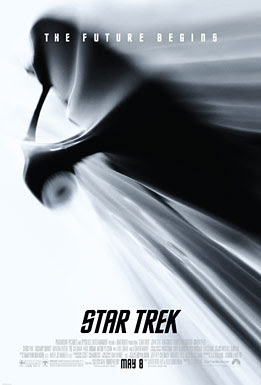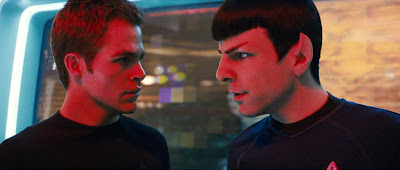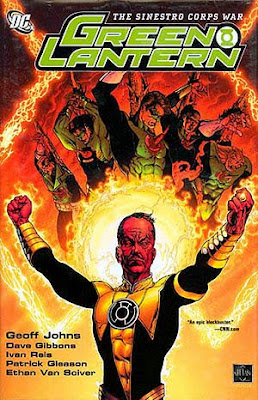 It's the only one I've seen in the theater three times, the only one I can recall crying in EACH of those times, and deserves to be hailed as a science-fiction achievement if for only two words: alternate universe.
It's the only one I've seen in the theater three times, the only one I can recall crying in EACH of those times, and deserves to be hailed as a science-fiction achievement if for only two words: alternate universe. Did Star Trek invent the theory of alternate universes? I don't know, but they appear in one form or another in a lot of the series' episodes. Some are more overt, like the famous "Mirror, Mirror" episode, and some are more subtle, seeing characters act, well, out-of-character due to one reason or another. It's been a staple of Star Trek lore but thus far hasn't been approached in film, until now.
Did Star Trek invent the theory of alternate universes? I don't know, but they appear in one form or another in a lot of the series' episodes. Some are more overt, like the famous "Mirror, Mirror" episode, and some are more subtle, seeing characters act, well, out-of-character due to one reason or another. It's been a staple of Star Trek lore but thus far hasn't been approached in film, until now.In the first ten SECONDS of the film, we get a time-traveling anomaly that changes the Star Trek universe ten minutes later. (I'm not about spoiling, but I will admit that I teared up in the theater ALL THREE TIMES I saw the film during that sequence.) As a result of this ripple, this allows director J.J. Abrams and his team of crack writers to craft a new Star Trek alternate universe where he has license to play with the characters and situations and yet preserve the cannon of the other series and films. The characters (Spock deduces it, naturally) themselves realize this midway through the film, that this original anomaly has changed their time line forever. It's the moment that Star Trek was born for and was finally realized by J.J. Abrams. In one master storytelling stroke, J.J. was able to preserve the past, invigorate the present, and leave the entire future open to new and exciting possibilities. And for THAT, it's a damn triumph.
 It doesn't hurt that the performances, pace, action, effects, music, and story are also tight. Even the historical winks -- the Kobayashi Maru sequence jumps to mind -- are fun, fan-orgasmic, and not so much interwoven to but also serve to drive the plot. Heck the trailer itself gives me goose-bumps. This is Star Trek for Star Wars fans, something that has danger, crackles, and is bold entertainment from start-to-finish. I kinda liked it.
It doesn't hurt that the performances, pace, action, effects, music, and story are also tight. Even the historical winks -- the Kobayashi Maru sequence jumps to mind -- are fun, fan-orgasmic, and not so much interwoven to but also serve to drive the plot. Heck the trailer itself gives me goose-bumps. This is Star Trek for Star Wars fans, something that has danger, crackles, and is bold entertainment from start-to-finish. I kinda liked it.



